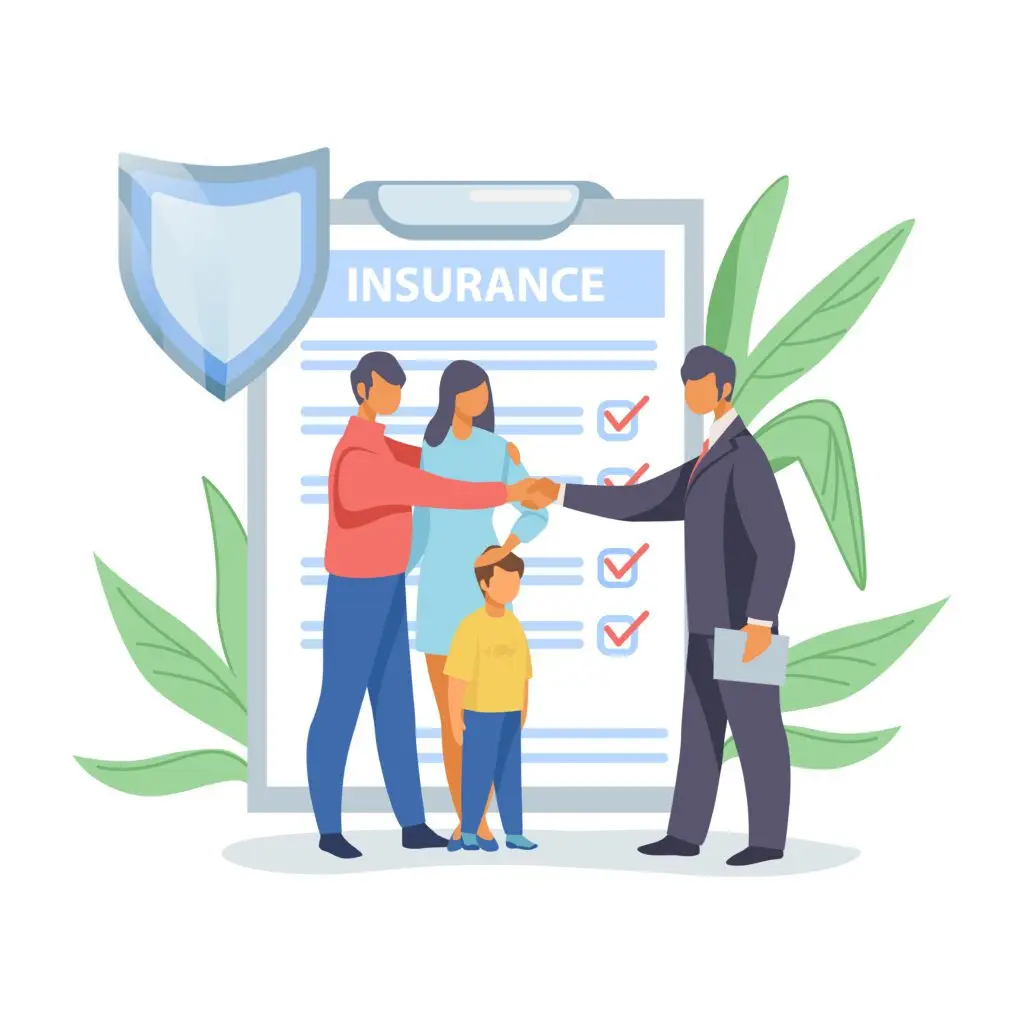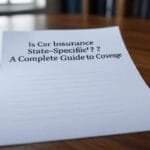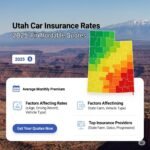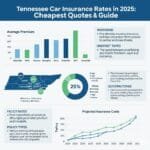Shopping for car insurance can feel like navigating a maze of endless phone calls, spam emails, and intrusive questions about your personal life. But it doesn’t have to be this way. Imagine finding the perfect car insurance coverage, comparing prices, and getting accurate quotes—all without feeling like you’re surrendering your privacy. Sounds too good to be true? It’s not!
We know that when you’re just starting to shop around for car insurance, you don’t want to end up on a dozen marketing lists or have your inbox flooded with endless follow-ups. The process can feel overwhelming, especially when you’re asked to hand over personal details right from the start. But what if there was a way to get car insurance quotes without sharing everything upfront or getting bombarded by unwanted calls?
The truth is, you can get accurate, anonymous car insurance estimates without giving away your personal information. By following a few simple steps, you can protect your privacy while still comparing prices from top insurance companies. Whether you want to see how much your policy could cost or just explore your options, you can do all this without sacrificing control over your data.
Wouldn’t it be great if you could shop for car insurance the way you want—without sharing your full name, email, or phone number until you’re ready? You can. In this guide, we’ll show you exactly how to get started, which tools to use, and which insurers are best for maintaining your privacy.
Take charge of your insurance journey today. Learn how to gather car insurance quotes in a way that puts you in control of your data. Start with anonymous estimates, use privacy-focused tools, and make well-informed decisions on your terms—all while keeping your details private. Ready to get started? Let’s dive in!
Understanding the Difference: Anonymous Estimates vs. Official Quotes
Remember, the key to finding suitable car insurance quotes is to compare a variety of options.
First, it is helpful to clear up a significant point of confusion. When shopping for insurance, two types of quotes are available. Knowing the difference is the key to protecting privacy.
- Anonymous Estimate: Think of this as a ballpark figure. It’s a rough guess of what someone might pay for car insurance. To get an estimate, only basic, non-personal information is needed. This is the perfect first step for shopping around.
- Official Quote (or Binding Quote): This is a firm offer from an insurance company based on detailed personal information. This is the price that will be paid if a decision is made to buy the policy. Reaching this stage is only necessary when a trusted company has been chosen.
| Feature | Anonymous Estimate | Official Quote |
| Purpose | Initial research and comparing companies. | A final, purchasable offer. |
| Information Needed | Minimal (ZIP code, car type, age). | Detailed (Name, address, driver’s license). |
| Accuracy | A good guess, but not exact. | Highly accurate price. |
| Best For | Comparing prices from many companies without spam. | Making a final decision and buying a policy. |
Starting with anonymous estimates allows shoppers to scout the market safely. It is possible to see which companies offer the best prices for a specific driver profile without having to share your phone number and email address with everyone.
Why Do Insurance Companies Ask for Information?
We know it can feel invasive when a website asks for personal details. It helps to understand why the information is needed. Insurance companies use these details to figure out how likely a driver is to get into an accident or file a claim. This helps them decide on a fair price for a policy.
Here are the three main types of information they look at:
1. The Driver and Their Driving Record
Personal details help an insurer understand a driver’s profile.
- Age: Statistics show that age is a significant factor in accident rates. Younger, less experienced drivers typically pay more.
- Location (ZIP Code): Some areas have more traffic, theft, or accidents than others. A ZIP code helps them assess these local risks.
- Driving History: A clean record with no accidents or tickets shows a person is a safe driver and will earn a lower price.
2. The Car’s Details
The type of car being driven directly impacts its insurance rate.
- Make and Model: Some cars are more expensive to repair than others. A luxury car will cost more to insure than a standard sedan.
- Age of the Car: Older cars are often cheaper to insure because their replacement value is lower.
- Safety Features: Cars with modern safety features like automatic emergency braking or anti-theft devices can often lead to discounts.
3. The Credit Score (The Big Question)
Feel empowered to seek out the best car insurance quotes for your situation.
Keep in mind that many factors can affect the car insurance quotes you receive.
Stay informed about how to receive the most accurate car insurance quotes available.
This is a big concern for many, so let’s make it simple. When a car insurance quote is requested, the company performs a soft credit check, not a hard one.
With a dedicated approach, you can find the best car insurance quotes.
Focusing on your needs while seeking car insurance quotes is the best strategy.
- A soft credit check does not affect a credit score. It’s the same kind of check that happens when someone looks up their score.
- A hard credit check occurs when applying for a loan or a new credit card, which can temporarily lower a credit score.
By being strategic, you can maximize your chances of receiving favorable car insurance quotes.
Insurance companies use a credit-based insurance score because their data shows that people who manage their finances well tend to file fewer claims. However, some states do not allow this. In California, Hawaii, Massachusetts, and Michigan, insurers cannot use a credit score to determine a rate.
A 5-Step Guide to Getting Quotes Privately
Shopping for car insurance doesn’t have to be a headache. Following these five simple steps helps anyone stay in control of their information and find a great rate.
Step 1: Start With a Privacy-Focused Tool
Before going directly to insurance company websites, start with an online calculator or comparison tool that respects privacy. These tools provide several anonymous estimates from different companies at once. Only basic information, such as a ZIP code, car model, and age range, is needed. This is the fastest way to get a general idea of the market without giving out contact information.
Step 2: Create a “Quote-Only” Email Address
This is a simple but powerful trick. Before getting detailed quotes, create a new, free email address from a service like Gmail or Outlook. Something like “MyCarQuotes2025@email.com” works well. Use this email for all insurance shopping. This way, any marketing messages or follow-ups go to this separate inbox, not a personal one. Once a policy is purchased, a person can simply stop checking it.
Step 3: Know What to Share and What to Keep Private
When transitioning from anonymous tools to more detailed estimates, it’s crucial to understand what information should be shared and what can remain private.
Information likely needed for a reasonable estimate:
- ZIP Code
- Vehicle’s year, make, and model
- A summary of the driving record (e.g., “one speeding ticket in the last three years”)
- Age and marital status
Information that can usually be skipped for an initial estimate:
- Full name
- Phone number (never give this out unless a call is desired)
- Social Security number (SSN)
- Driver’s license number
- Full street address
If a form has a field that is not marked as required, feel free to leave it blank. The less that is shared at this stage, the better.
Step 4: Get Quotes Directly from a Shortlist
Once you gather multiple car insurance quotes, compare them thoroughly.
Look for the best value when considering your car insurance quotes.
After using a comparison tool, there should be a shortlist of three or four companies that look promising. Now, visit their websites directly. Use the “quote-only” email address and the limited personal information from Step 3 to get a more refined estimate from each one. This helps confirm the prices seen and provides a more accurate comparison.
Finding reliable car insurance quotes is essential for financial peace of mind.
Step 5: Give Real Information Only to the Final Choice
The right car insurance quotes can save you money in the long run.
After comparing options, it’s time to buy. Now is the time to provide complete and accurate personal information. Once the preferred company is selected, providing a full name, address, driver’s license number, and vehicle identification number (VIN) will be necessary to get a final, official quote and purchase the policy. By waiting until this final step, sensitive data has only been shared with one company instead of ten.
Which Companies Are Best for Anonymous Quotes?
Some insurance companies make it easier than others to get a quote without sharing too much information. Based on our research, some providers are more privacy-conscious during the initial quoting process.
Be sure to keep track of your car insurance quotes for future reference.
Here are a few companies known for requiring less personal information upfront:
- The General: Often requires minimal details to get a basic quote online, making them a good starting point for a quick estimate.
- Privacy Tip: Use their website instead of calling to avoid having to give a phone number early in the process.
- GEICO: Their online tool is streamlined and provides a reasonably accurate quote before asking for highly sensitive information like an SSN.
- Privacy Tip: Most of the “additional information” fields on their form may seem required, but they can often be skipped. Use a dedicated “quote-only” email address here.
- Progressive: Offers a “Name Your Price” tool that shows coverage options based on a budget. Their standard quote process also allows a rate to be seen before finalising all details.
- Privacy Tip: Look for a “skip this step” option when asked for a Social Security number. Be sure to find the “communication preferences” link to manage how they make contact.
Frequently Asked Questions
We know more questions might arise. Here are answers to some of the most common questions about getting car insurance quotes privately.
Can a car insurance quote be obtained without giving personal information?
A general estimate can be obtained without providing identifying details like a name, phone number, or email. However, some basic information, like a ZIP code, the car’s make and model, and an age range, will be needed to get a proper estimate.
Ultimately, the goal is to find the best car insurance quotes that suit your circumstances.
Will getting car insurance quotes hurt my credit score?
No. Insurance companies use a soft credit check to generate a quote, which does not affect a credit score. It’s different from the hard credit check used for loan or credit card applications.
Is it possible to buy a car insurance policy anonymously?
No, a policy cannot be purchased anonymously. A final, official policy requires providing a full name, address, driver’s license number, and other verifying information. Anonymity is only possible during the initial shopping and estimate phase.
How accurate are anonymous car insurance estimates?
Anonymous quotes are generally reasonable estimates, but they are not perfect. They are often within 15% to 30% of the final price. The final cost can be higher or lower once all details are provided and the company reviews the driving and credit history.
Can an insurance quote be obtained before buying a car?
Yes, and we highly recommend it! Getting a quote before buying a car is a smart financial move. It helps with budgeting for the full cost of ownership. It prevents the purchase of a car with unexpectedly high insurance premiums. Only the vehicle’s year, make, and model are needed to get an estimate.
Is it safe to get car insurance quotes online?
Yes, getting quotes online from legitimate insurance websites is safe. To be sure, look for the padlock icon and “https” in the website address bar. This shows the site is secure. Also, be wary of websites that are not from a specific insurance provider and ask for much information upfront, as they might be lead-generation sites that sell data.
Is it okay to lie on an application to get a cheaper car insurance quote?
No, a person should never lie on an insurance application. Providing false information is considered insurance fraud, which is a serious offence. If the company discovers the lie, they can deny claims, cancel the policy, and there could even be legal penalties. The risk is not worth the potential savings.
You Are in Control
Shopping for car insurance doesn’t have to mean giving up privacy or dealing with endless spam. Following an innovative and strategic approach keeps the consumer in complete control of their personal information.
Start with anonymous estimates to survey the options, use a dedicated email to keep a personal inbox clean, and only share detailed information with the one company chosen for business. This way, the right coverage can be found at a great price, all on one’s terms.





